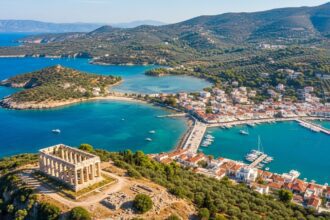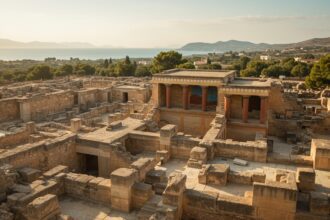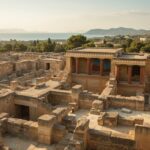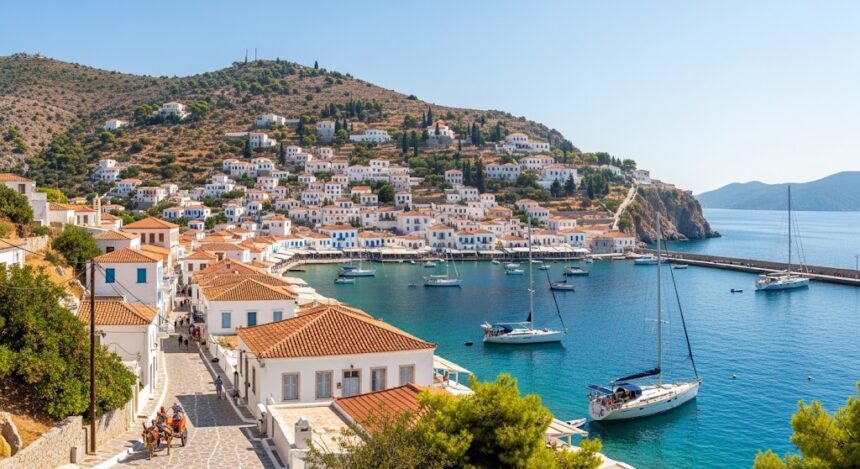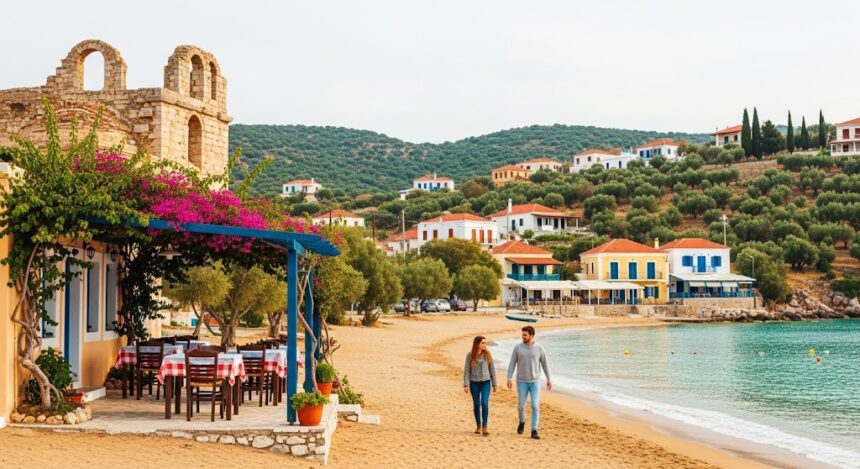Tired of crowded islands and bustling ancient sites? While Greece is rightfully famous for places like the Acropolis and Santorini’s caldera views, there’s an entire other side to this incredible country – one where ancient myths feel closer, traditions run deeper, and the pace of life slows to a gentle rhythm. We’re talking about Greece’s hidden villages, tucked away in mountainsides, clinging to cliffs, or nestled in verdant valleys. Exploring them offers a unique form of mythical Greece travel, taking you far from the usual tourist trails and into the heart of the country’s soul.
Beyond the Postcards: Why Go Off-the-Beaten-Path in Greece?
Choosing an off-the-beaten-path Greece adventure is about experiencing authenticity. In these lesser-known corners, you’ll find communities that have preserved their customs, architecture, and stories for centuries. The landscapes are often breathtakingly dramatic, serving as natural stages for the myths that were born here. Imagine walking ancient paths where nymphs were said to dance, or seeing peaks that were home to the gods, stepping into a narrative that spans millennia.
These villages offer a tangible connection to Greece’s rich tapestry of myths and legends. The stories of gods, heroes, and mythical creatures aren’t confined to museums or history books; they are woven into the very fabric of the land and the lives of the people who inhabit it. Let’s embark on a journey to discover five such mythical villages you likely haven’t heard of.
Five Mythical Villages Waiting to Be Discovered
1. Anogia, Crete: Cradle of Zeus and Resilience

High in the Psiloritis mountains of Crete lies Anogia. While tragically known for its history of resistance and destruction during WWII, its roots delve much deeper into myth. This region is intrinsically linked to the king of the gods himself, Zeus. According to legend, Zeus was born and hidden from his father Cronus in a cave on Mount Ida (Psiloritis), not far from Anogia. Exploring the slopes around the village, you can feel the ancient energy of this sacred mountain.

Anogia retains a strong sense of Cretan identity and independence. The local men, often seen in traditional dress, are known for their hospitality and pride. The village’s history of defiance adds a layer of heroic legend to its mythical landscape. Visiting Anogia offers a powerful blend of ancient mythology, recent history, and authentic rural Greek culture.
2. Litochoro, Pieria: Gateway to Mount Olympus

While perhaps slightly more known than others on this list due to its proximity, Litochoro remains a world away from Greece’s coastal resorts. Nestled at the foot of Mount Olympus, the legendary abode of the twelve Olympian gods, Litochoro is the primary starting point for hikers venturing up the mythical peak. The village itself is charming, with traditional Macedonian architecture and stunning views of both the mountain and the Aegean Sea.

Standing in Litochoro, looking up at the often cloud-shrouded peaks of Olympus, it’s easy to imagine Zeus on his throne, Hera overlooking the world, or Apollo playing his lyre. The very air feels charged with divine possibility. This is a must-visit for anyone seeking a tangible connection to the heart of Greek mythology and is a prime example of mythical Greece travel.
3. Dimitsana, Arcadia: Land of Nymphs and Pan

Deep in the rugged heart of the Peloponnese lies Arcadia, a region synonymous with pastoral bliss and the god Pan, ruler of the wild, shepherds, and flocks. Dimitsana is a historical village perched dramatically above the Lousios River gorge. The Lousios River itself has mythical ties, said to be one of the rivers where the infant Zeus was bathed by nymphs.

Dimitsana and the surrounding villages along the Lousios gorge (like Stemnitsa and Palaihori) feel like stepping into a different era. Stone houses cling to steep slopes, monasteries are built into cliffsides, and the sound of rushing water fills the air. This is a place where the ancient connection between nature, myth, and human life is still palpable. Exploring the gorge trails, you half expect to hear the pipes of Pan or catch a glimpse of a fleeting nymph.
4. Kalarrytes, Epirus: Spirits of the Pindus Mountains

Tucked away in the remote Pindus mountains of Epirus, Kalarrytes is a village that feels truly lost in time. Historically a center for silversmithing and nomadic Vlach shepherds, reaching Kalarrytes is an adventure in itself, involving winding mountain roads and dramatic gorges. This isolation has helped preserve a unique way of life and a deep connection to the rugged landscape.

While not directly tied to major Olympian myths, the Pindus mountains have their own ancient lore. These imposing peaks and deep valleys were believed to be home to mountain spirits, nymphs, and other mythical beings associated with the wilderness. The sheer scale and solitude of the landscape around Kalarrytes evoke a sense of ancient mystery, where the forces of nature feel powerful and untamed, a perfect setting for exploring hidden Greek villages.
5. Assini, Argolid: Echoes of the Mycenaean Age

Located near the popular town of Nafplio in the Argolid region of the Peloponnese, Assini is often overlooked. Yet, it boasts an ancient acropolis with history stretching back to the Mycenaean era, the age of heroes like Agamemnon, Odysseus, and Achilles. The Argolid is the heartland of many of these epic tales, centered around mighty Mycenae and Tiryns.

While Assini itself isn’t a major myth site, its ancient ruins and location within the mythical landscape of the Argolid make it a fascinating stop. Standing on the ancient acropolis overlooking the sea, you are literally in the backyard of some of the most famous Greek myths. It offers a quieter, more contemplative way to connect with the Bronze Age world that gave rise to so many legends, exploring the fringes of this rich historical and mythical region.
Practical Tips for Your Mythical Village Adventure
Getting There and Around
Exploring these hidden Greek villages requires flexibility. A rental car is highly recommended, if not essential. Roads can be winding and narrow, especially in mountainous areas, so drive cautiously. GPS is helpful, but a good old-fashioned map can also be useful in remote spots. Public transport to these specific villages is often limited or non-existent.
Where to Stay
Forget large hotels. These villages offer charming guesthouses (archontika), traditional stone houses converted into accommodations, or small family-run inns. Booking ahead, especially during shoulder seasons (spring and autumn are ideal for weather and fewer crowds), is wise. Staying locally is the best way to immerse yourself in the rural Greek culture and support the community. Consider looking for “off-grid stays” or eco-lodges if you want a truly secluded experience.
Dining Like a Local

Food in these villages is often simple, fresh, and incredibly flavorful. Seek out the local taverna (or kafeneio that serves food). Don’t expect extensive menus; instead, ask what’s fresh or what the specialty is. You’ll likely find delicious slow-cooked stews, local cheeses, wild greens (horta), and grilled meats. It’s an authentic taste of Greece, often made with ingredients sourced from the surrounding land.
Respecting Local Culture
Remember you are visiting living communities, not just attractions. Greet locals (a simple “Kalimera” for good morning or “Kalispera” for good evening goes a long way), dress modestly when visiting churches or monasteries, and be mindful of noise levels, especially in the evenings. Engaging with locals, even with limited language, can be incredibly rewarding.
Consider hiring a local guide for a walk or tour in some areas. They can offer insights into the village’s history, traditions, and connection to the landscape that you won’t find in guidebooks, enhancing your mythical Greece travel experience.
The Power of Rural Greek Culture
The preservation of myths and history in these villages isn’t accidental. It’s deeply intertwined with the continuity of rural Greek culture. In places less affected by mass tourism and rapid modernization, oral traditions remain strong. Stories are passed down through generations, often linked to specific landmarks, family histories, or local customs. The rhythm of life, tied closely to the seasons and the land, mirrors the ancient world in ways that urban life cannot replicate.

Visiting these villages offers a unique perspective on how myths function – not as static tales from the distant past, but as narratives that inform identity, explain the landscape, and connect people to their heritage. It’s a powerful reminder that Greece is a living culture with deep roots.
Plan Your Mythical Escape
If you’re looking for a truly enriching and unforgettable travel experience in Greece, venture beyond the obvious. These five villages, and countless others like them scattered across the mainland and islands, offer a chance to connect with the soul of the country, walk in the footsteps of legends, and discover the enduring magic of mythical Greece travel. Use these Greece travel tips to start planning your own adventure into the hidden corners of this extraordinary land.
Whether you’re drawn by the call of Zeus on Crete, the divine presence of Olympus, the wild beauty of Arcadia, the rugged spirit of Epirus, or the ancient echoes of the Argolid, these off-the-beaten-path Greece destinations promise a journey filled with discovery, authenticity, and a touch of the mythical.








